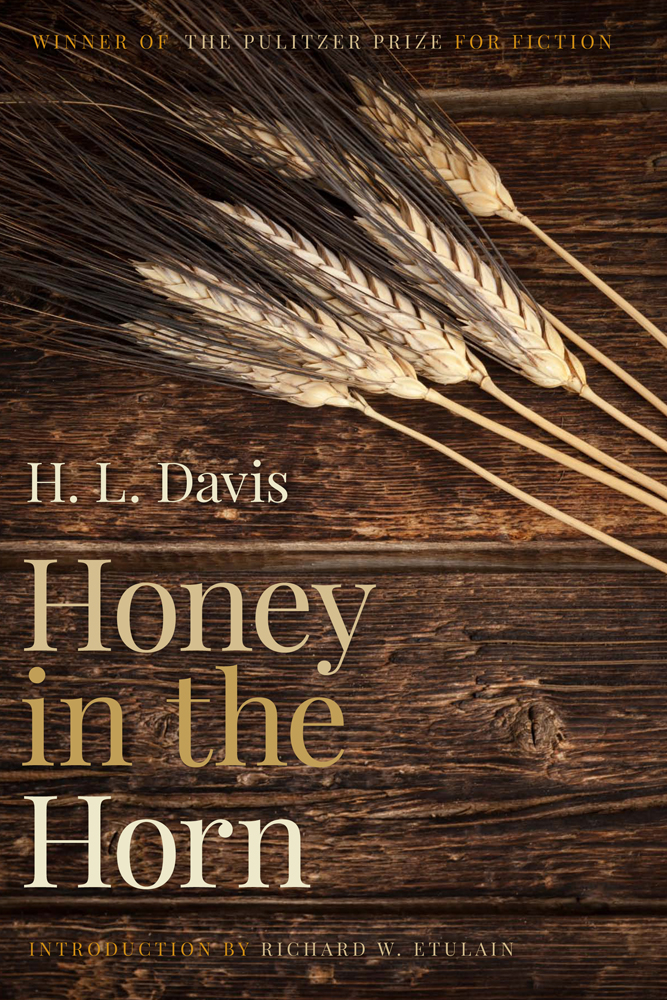Some books must be read more than
once. Some books appeal to multiple generations. And some books fit into both
categories. Historian Richard W. Etulain joins us today to discuss the powerful
prose of one of Oregon’s greatest literary legacies.
--------------------------------
Ask an
Oregonian to identify the only novelist from the state to win a Pulitzer Prize.
The frequent—and wrong—answers are Ken Kesey, Ursula LeGuin, or, for the
younger set, Chuck Palahniuk.
The
correct response: H. L. Davis’s Honey in
the Horn (1935), which snagged a coveted Pulitzer in 1936. It also won the Harper Prize for 1935.

I
learned of Davis and his nationally recognized novel when I was in graduate
school at the University of Oregon in the early 1960s. Davis had died in 1960, but among
Oregon’s literary cognoscenti he was still remembered.
Harold
Lenoir Davis broke free from the numbing traditions of previous writers in the
Pacific Northwest. He avoided the
romance genre Frederic Homer Balch utilized in his long-popular Bridge of the Gods (1890) and kept his
distance from the formula-ridden Westerns of Zane Grey and Max Brand.
Instead,
as I came to realize, Davis had, by diligent work, become a superb regional
writer. He did for the Pacific
Northwest what William Faulkner did for the South, John Steinbeck for
California. Most of all, regional writers like Davis showed how regions or
places shaped diverse characters.
While in
Eugene I encountered Status Rerum (1927),
the scandalous pamphlet Davis and James Stevens concocted attacking Pacific
Northwest creative writing teachers and their students. These misguided mentors were, Davis and
Stevens chuckled, nothing but “posers, parasites, and pismires” turning out an
“interminable avalanche of tripe.”
They didn’t even know how to “castrate calves.”
Status Rerum prepared the way for Honey in the Horn. Davis would then go his own stubborn
way, avoiding the romance and the Western and turning out fiction rich in
regional settings, local speech patterns, and individualistic character types.
When I
dipped into Honey in the Horn,
Davis’s first novel, I was immediately drawn to the familiar “growing up” theme
at the center of his novel. Two
youthful wanderers without strong, experienced moorings, Clay and Luce, drift
through Davis’s marvelously described landscapes—from the Oregon Coast, to the
Willamette Valley, and on to the High Deserts.
Some
readers exult over Davis’s vivid landscapes. They should. But I am even more intrigued by his wry,
pungent characterizations of a whole gamut of regional character types. His character vignettes depict a
spectrum of pioneer figures that Oregon’s previous—and many later—writers have
overlooked. More than a few of
Davis’s characters seem like vagabonds searching, often unsuccessfully, for
Oregon places in which to root themselves.
Understandably,
Davis’s unvarnished treatment of Oregon and its early settlers alienated the
state’s cultural chauvinists.
Unbowed, Davis moved on to write a clutch of strong novels, short
stories, and essays about the Oregon Country. All overflowed with a redolent regionalism, demonstrating
how a talented author could exhibit the molding power of physical and cultural
environments on a collage of colorful characters.
The
Oregon State University Press does a meritorious service in reprinting Davis’s
path-breaking novel. The
reappearance of Honey in the Horn will
introduce a new generation to an Oregon literary classic, the first novel in
the Pacific Northwest to gain national prominence. Davis’s premier work of fiction richly merits a fresh wave
of appreciative attention.
--------------------------------
Originally published in 1935, Honey in the Horn once more hits the
press this June to reach a new generation of readers. Lauded even in Davis’s
lifetime, the book captures Oregon spirit and history in a nearly tangible way
that hasn’t been seen since. Commemorate
Davis and his legacy Wednesday, June 10, at a celebration sponsored by the
Umpqua Valley Arts Association and While Away Books. Including readings from
authors like Robert Heilman and Karen Tolley, the event will begin at 7:00 p.m.
at the Umpqua Valley Arts Association Art Center in Roseburg.
Discover the raw beauty of Honey in the Horn for yourself here,
updated with an introduction by Richard W. Etulain.
H. L. Davis (1894 – 1960) was an Oregon novelist and poet
whose work emphasized the beauty of place and landscape. Davis created gritty,
realistic characters whose lives were far from perfect, overturning the
popularized romanticism of the West. His 1935 novel, Honey in the Horn, earned him a Pulitzer Prize, making him the only
Oregonian to have ever earned the honor.
Richard W. Etulain is the author or editor of more
than fifty books, including Conversations
with Wallace Stegner on Western History and Literature, Beyond the Missouri:
The Story of the American West, and Lincoln
and Oregon Country Politics in the Civil War Era. A Professor Emeritus of
History at the University of New Mexico, he lives in Clackamas, Oregon.
